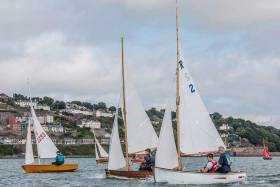Displaying items by tag: rankin dinghy
For the first time in five years the Rankin dinghy ‘Worlds’ will be held again this season.
The Rankins are a revered Cork Harbour class that was revived, beginning in 2016, by dedicated enthusiasts in Cobh and is now thriving again as part of Cove Sailing Club.
The ’Worlds were last held in 2019 and will be race again on June 29 and 30. hosted by the Royal Cork YC at Crosshaven.
The title ‘holders’ from then are Conor and Robbie English. Conor was one of the two leaders who led the revival of the Rankins.
 Rankin R4 and Helga of the fleet on the Cork Harbour dinghy class's first sail of 2024 Photo: Rankins/Facebook
Rankin R4 and Helga of the fleet on the Cork Harbour dinghy class's first sail of 2024 Photo: Rankins/Facebook
The other, Maurice Kidney, told me: “We are eagerly looking forward to the revival event.
“As of now, we've 23 confirmed boats and anticipate another five, which gives us upwards of 28 boats on the water. Peter Crowley of the RCYC, himself a long-time Rankin enthusiast, has kindly agreed to be the Sailing Coordinator for the weekend.
“While the emphasis will be on participation, it can be expected to be fairly hot at the top of the fleet.
“Alex Barry will be sailing his brother Colin’s boat, Tommy Dwyer, in scintillating form at Rankin events last year are ones to note. There are many others. The ‘Worlds’ will be a great event.”
Maurice Kidney's Rankin continues to lead the Wednesday Night Dinghy League at Cove SC in Cork Harbour on 7 points from Owen O'Connell.
The latter continues second in another Rankin on 9, with Joe Keenan making up the top trio in his Solo on 15 points.
There are 16 boats in the fleet.
12 Rankins Contest Cork Harbour Regatta Race
Last Saturday in Cork Harbour saw the fourth Annual sailing of The Rankin Regatta Race since boat owners got together to form the group in 2014.
Twelve sailing Rankins took to the water for the first gun and a hotly contested race ensued. Damien Ahern's 'Star Ship Enterprise' made a tremendous start and looked for much of the race as if she would be regatta race winner for the second consecutive year. Damien's lead, however, was being pegged back by some great sailing in the following fleet.
Ewan O Keeffe's boat, along with Owen O Connell in Helga and Johnny Horgan's 'Freedom V' were nip and tuck coming up to the finish line with Johnny's 'Freedom V' taking the winner's gun just ahead of Owen in the Helga and Ewan O Keeffe a close third.
A great race well sailed by all boats and so fitting that the first Rankins built finished in the top two places in this year's race.
























































